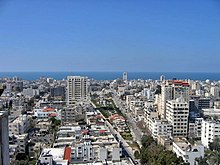Portal:Cities
The Cities Portal

A city is a human settlement of a substantial size. The term "city" has different meanings around the world and in some places the settlement can be very small. Even where the term is limited to larger settlements, there is no universally agreed definition of the lower boundary for their size. In a narrower sense, a city can be defined as a permanent and densely populated place with administratively defined boundaries whose members work primarily on non-agricultural tasks. Cities generally have extensive systems for housing, transportation, sanitation, utilities, land use, production of goods, and communication. Their density facilitates interaction between people, government organizations, and businesses, sometimes benefiting different parties in the process, such as improving the efficiency of goods and service distribution.
Historically, city dwellers have been a small proportion of humanity overall, but following two centuries of unprecedented and rapid urbanization, more than half of the world population now lives in cities, which has had profound consequences for global sustainability. Present-day cities usually form the core of larger metropolitan areas and urban areas—creating numerous commuters traveling toward city centres for employment, entertainment, and education. However, in a world of intensifying globalization, all cities are to varying degrees also connected globally beyond these regions. This increased influence means that cities also have significant influences on global issues, such as sustainable development, climate change, and global health. Because of these major influences on global issues, the international community has prioritized investment in sustainable cities through Sustainable Development Goal 11. Due to the efficiency of transportation and the smaller land consumption, dense cities hold the potential to have a smaller ecological footprint per inhabitant than more sparsely populated areas. Therefore, compact cities are often referred to as a crucial element in fighting climate change. However, this concentration can also have some significant negative consequences, such as forming urban heat islands, concentrating pollution, and stressing water supplies and other resources. (Full article...)
Selected city -
Luanda (/luˈændə, -ˈɑːn-/, Portuguese: [luˈɐ̃dɐ]) is the capital and largest city of Angola. It is Angola's primary port, and its major industrial, cultural and urban centre. Located on Angola's northern Atlantic coast, Luanda is Angola's administrative centre, its chief seaport, and also the capital of the Luanda Province. Luanda and its metropolitan area is the most populous Portuguese-speaking capital city in the world and the most populous Lusophone city outside Brazil. In 2020 the population reached more than 8.3 million inhabitants (a third of Angola's population).
Among the oldest colonial cities of Africa, Luanda was founded in January 1576 as São Paulo da Assunção de Loanda by Portuguese explorer Paulo Dias de Novais, being occasionally called "Leonda" or "St Paul de Leonda" by non-portuguese sources. The city served as the centre of the slave trade to Brazil before the institution was prohibited. (Full article...)
Did you know -
- ... that the book A City on Mars covers sex in space, raising children in low gravity, space law, and space cannibalism?
- ... that actress Katharine Hepburn threatened to remove her name from a garden in Dag Hammarskjöld Plaza when New York City officials said they would not widen the plaza?
- ... that a showing of the 1914 film Lord Chumley on the roof of a New York City theatre was canceled with an on-screen announcement due to its 40-minute runtime?
- ... that the 1971 Hazelwood massacre was the largest mass murder in the history of "Murder City"?
- ... that in 2007, Jeremiah Moss started Jeremiah's Vanishing New York, a blog that functions as a "digital obituary column" for old New York City small businesses lost to gentrification?
- ... that when part of New York City's Hotel Riverview became a theater, some people thought that the hotel's overflowing toilets and leaky ceilings were part of the show there?
Related portals
Related WikiProjects

Gaza, also called Gaza City, is a city in the Gaza Strip, Palestine. As of 2022, it was the largest city in the State of Palestine, with 590,481 inhabitants in 2017. The city is spread across an area of 45 square kilometres (17 sq mi). Gaza is one of the principal coastal cities in the country, home to Palestine's only port. Located some 76.6 kilometres (47.6 mi) southwest of the country's proclaimed capital East Jerusalem, the city is located on the coast of the Mediterranean Sea. Prior to the 2023 Israel–Hamas war, it was the most populous city in the State of Palestine, when massive displacement happened during the war.
Inhabited since at least the 15th century BC, Gaza has been dominated by different peoples and empires throughout its history. The Philistines made it a part of their pentapolis after the ancient Egyptians had ruled it for nearly 350 years. Under the Roman Empire, Gaza experienced relative peace and its Mediterranean port flourished. In 635 AD, it became the first city in the Palestine region to be conquered by the Rashidun army and quickly developed into a centre of Islamic law. However, by the time the Crusader states were established in 1099, Gaza was in ruins. In later centuries, Gaza experienced several hardships—from Mongol raids to severe flooding and locust swarms, reducing it to a village by the 16th century, when it was incorporated into the Ottoman Empire. During the first half of Ottoman rule, the Ridwan dynasty controlled Gaza and the city went through an age of great commerce and peace. The municipality of Gaza was established in 1893. (Full article...)
Selected article -

The following is a list of host cities of the Olympic Games, both summer and winter, since the modern Olympics began in 1896. Since then, summer and winter games have usually celebrated a four-year period known as an Olympiad. From the inaugural Winter Games in 1924 until 1992, winter and summer Games were held in the same year. Since 1994, summer and winter Games have been held in staggered even years. Through 2024, there have been 30 Summer Olympic Games, held in 23 cities, and 24 Winter Olympic Games, held in 21 cities. In addition, three summer and two winter editions of the games were scheduled to take place but were later cancelled due to war: Berlin (summer) in 1916; Sapporo–Garmisch-Partenkirchen (winter) and Tokyo–Helsinki (summer) in 1940; and Cortina d'Ampezzo (winter) and London (summer) in 1944. The 1906 Intercalated Olympics were officially sanctioned and held in Athens. However, in 1949, the International Olympic Committee (IOC) decided to unrecognize the 1906 Games. The 2020 Summer Olympics in Tokyo were postponed for the first time in the Olympics history to summer 2021 due to the COVID-19 pandemic, with the 2022 Winter Olympics being held roughly six months later in Beijing which also hosted the 2008 Summer Olympics.
Five cities and regions have been chosen by the IOC to host upcoming Olympic Games: the 2026 Winter Olympics will be the first Olympic Games officially shared between two host cities (Milan and Cortina d'Ampezzo); Los Angeles for the 2028 Summer Olympics; the 2030 Winter Olympics will be the first Olympic Games to be hosted by a region (the French Alps—comprising 7 cities and towns); Brisbane will host the 2032 Summer Olympics; and Salt Lake City will host the 2034 Winter Olympics. (Full article...)
General images -
Topics
List articles
Subcategories
Associated Wikimedia
The following Wikimedia Foundation sister projects provide more on this subject:
-
Commons
Free media repository -
Wikibooks
Free textbooks and manuals -
Wikidata
Free knowledge base -
Wikinews
Free-content news -
Wikiquote
Collection of quotations -
Wikisource
Free-content library -
Wikiversity
Free learning tools -
Wiktionary
Dictionary and thesaurus








































